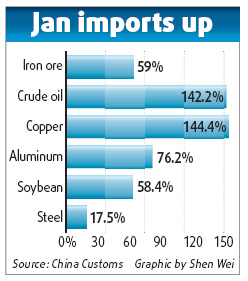Economy
New trade figures could ease yuan pressure
By Ding Qingfen (China Daily)
Updated: 2010-02-11 07:00
 |
Large Medium Small |
Growing domestic consumption and the international balance of payment have led to a rise in the country's latest imports and a drop in trade surplus, which analysts say will likely ease pressure on yuan appreciation.

Imports in January skyrocketed by 85.5 percent from a year earlier, when companies were left idle for the weeklong Spring Festival holiday, customs figures showed.
| ||||
China's imports in January reached $95.31 billion, buoyed by burgeoning demand on resource-related products including copper, iron ore and aluminum. The increase in turn led to a trade surplus fall of 64 percent from last year's $39.3 billion figure.
January exports rose 21 percent from a year earlier, up from a 17.7 percent growth in December, customs figures showed yesterday.
Despite the increase, the country's exports fell from December last year. In January, exports increased by 21 percent to $109.47 billion year-on-year, but it declined by 16 percent compared with the previous month.
With the growth of imports expected to remain high in the months ahead and the outlook of exports grim, analysts said pressure for the appreciation of the yuan will not grow in the short term.
"The month-on-month figures show that recovery of China's exports is still fragile, but any strain for the revaluing of the yuan is loosening," said Standard Chartered economist Yan Jinny.
"There is little possibility that China will appreciate the yuan in the first half," she said.
China's exports started to rebound last December, rising for the first time since November 2008 by 17.7 percent and subsequently adding new pressure on the Chinese government to appreciate the yuan.
United States President Barack Obama also said recently that his country will get much tougher with China on trade and currency issues, in response to complaints that US exports are at a disadvantage because of the currency issue.
But Chinese economists have urged the government not to hasten the appreciation of the yuan under US pressure.
"It's really difficult to evaluate January figures as the growth (for exports) is mainly supported by the low reference point back in 2009 due to the financial crisis, and the growth for the first quarter will likely remain high," said Li Jian, a researcher from the trade research institute under the Ministry of Commerce.
Last year, China for the first time surpassed Germany as the world's largest exporter. But Minister of Commerce Chen Deming predicted at the annual commerce working conference that China's exports this year will present a hopeful picture as the global economic recovery is in limbo.
"It's not the right time to revalue the yuan as China is still very much reliant on exports," said Wang Xiaoguang, a Chinese economist and researcher from the decision consulting department of the Chinese Academy of Governance.
Imports momentum
The increase in China's imports in January was also the third consecutive month of growth, with prices going up as well.
"The imports were led up by growing investment made by the Chinese government," Wang said.
Imports of resource-related goods including iron ore, crude oil, steel, copper and aluminum grew by 59, 142.2, 17.5, 144.4 and 76.2 percent, respectively, in terms of value.
"As the policy on boosting domestic consumption is continuing, the momentum will be sustained and this could help China keep its currency stable," Wang said.
Vice-Premier Li Keqiang said China, faced by a gloomy export situation, will try to boost domestic consumption to drive up the economy.











